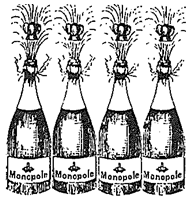Roger Scruton: Kant; Oxford University Press; New York.
Peter Singer: Hegel; Oxford University Press; New York.
J. O. Urmson: Berkeley; Oxford University Press; New York.
Michael Howard: Clausewitz; Oxford University Press; New York.
Peter France: Diderot; Oxford University Press; New York.
Peter Stansky: William Morris; Oxford University Press; New York.
While most things liberal tend to be perverse, distorted, or somehow malign, we do, however, support one thing that has the word liberal appended to it as an adjective: liberal education. Certainly, in this age of computerized, technocratic specialization, the world of bytes and bauds, wherein a degree in engineering translates into big bucks and hefty perks and a degree in one of the humanities often leads–if not to the door–to a low paying job in a once unimagined profession (e.g., a history major pushing furniture at Sears), there is something to be said for those people who try to internationalize the Arnoldian “best that has been known and thought.” They deserve support, not saliva tests. But there is a danger inherent in the contemporary situation if the alternative to the specialist, the person who knows a great deal about a few things, is seen as being the generalist, if that generalist perceives his or her role as being, figuratively speaking, that of a river that’s a mile wide and an inchdeep. Such a person would know virtually nothing about a wide gamut of things; he or she would be qualified to be, at best, a champion player of Trivial Pursuit (i.e., “What was Newton’s dog’s name?” not “Talk about the Newtonian universe”).
These thoughts are provoked by a series of slim–averaging 100 pages each–volumes on philosophers and writers produced by Oxford University Press. (The university was founded in 1167–should anyone ask.) Each of the books is authored by a person who is an expert in the specific field, and each of the authors is, as far as the present tasks are concerned, modest. One of the best of the self-effacing opening comments in any of the prefaces or initial remarks is found in Roger Scruton’s Kant:
I have tried to present Kant’s thought in a modern idiom, while presupposing the least possible knowledge of philosophy. Since Kant is one of the most difficult of modern philosophers [later Scruton figures him “The greatest modern philosopher,” which makes some of the other volumes suspect], I cannot hope that I have made every aspect of this thought intelligible to the general reader. It is not clear that every aspect of this thought has been intelligible to anyone, even to Kant.
Given the final sentence, it’s hard to imagine that the rudimentarily educated “general reader” would care to ponder even a subatomic-sized rendering of Critique of Pure Reason.
Still, Scruton on Kant, Singer on Hegel, Urmson on Berkeley, Howard on Clausewitz, France on Diderot, and Stansky on Morris are, with minor variations and petty reservations, all worth an evening’s reading. However, the books should all carry a Surgeon-General-cigarette-pack-like warning, one that would boldly state that anyone who thinks that he or she knows the subject in question through even the most careful reading of the volume at hand is damaging his or her mental health, to say nothing of that of those who will undoubtedly have to endure “learned” cocktail-party treatises.

Leave a Reply